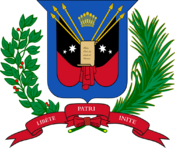Council of State (Carucere)
| National Council of Carucere | |
|---|---|
| Nasyonal Konsey Karuke | |
 Coat of Arms of Carucere | |
| Government of Carucere | |
| Style | His/Her Excellency |
| Status | Head of government |
| Appointer | Electoral college |
| Term length | Four years, no term limit |
| Inaugural holder | |
| Formation | 1972 |
The National Council of Carucere (Papotement: Nasyonal Konsey Karuke), is an executive body which serves as the collective de jure head of government of Carucere. While the President of Carucere is the leading political figure within the National Council as de facto head of state, it is the Council as a whole that serves as the highest executive authority in Carucere.
The number of members on the National Council typically varies, but it always includes the President of Carucere, Vice-President, and Premier. The National Council formally exercises executive power in Carucere, such as the authority to formulate policies and draft measures. The Council oversees the administration of the country through its supervision of the Cabinet, which consists of the heads of government ministries. The Council also serves as an unofficial upper house to the Senate. Although the President is the permanent presiding officer of the Council, they are primus inter pares within the Council which operates through consensus decision-making.
Composition
The exact number of members that preside on the National Council has varied since its creation, based upon political convention. The Constitution of 1972, mandated the inclusion of seven members but gave no limit to the number of delegates the President may appoint. In the 1990s, the Senate limited the number of delegates the President may appoint up to ten; as a result the maximum number of delegates that could serve on the National Council is seventeen.
Today the Council consists of the following members:
- President of the National Council
- Vice-President and Chairman of the National Council.
- Four members of the Cabinet.
- Minister of Defense, Home Affairs and External Communications
- Minister of Foreign Affairs
- Minister of Finance, Economic Planning and Development
- Minister of Housing and Land Use Planning
- Premier of Carucere.
- Other delegates appointed by the President.
Current members
Role
Carucere has a de-facto fusion of a presidential and a collegiate system. While the President decides the direction and priorities of the Government as the permanent presiding officer, ultimately executive power is collectively wielded by the Council. While the President can wield some political influence as de jure head of state, ultimately their de facto power relies on a supportive National Council, and is not directly attributed to the post of president. Traditionally the Council operates "above" ethnic partisanism, representing the entire country instead.
The Council's greatest power is their ability to appoint the Premier and other members of the Cabinet. However, since the Senate must approve the election by a majority vote, the Premier named by the president must be supported by the Senate, or the candidate will be denied. The National Council has the discretionary power to dissolve the Senate when they see fit, such as when the National Council is unable to govern due to the Senate's disapproval. The Council must promulgate all laws enacted by the Senate for them to come into force. However the National Council has the authority to veto laws, although the Senate can override this by a two-thirds majority vote. They may also refer the law for review by the Constitutional Council if the Council votes to doubt its constitutionality.
As the main executive organ, the Council defines the collective political and policy direction of the Government and oversees the Cabinet to ensure the implementation of policy as determined by the National Council. The National Council also has limited legislative initiative by enacting decrees with the full force of law and by submitting legislation to the Senate. All bills must be approved by the National Council for it to become law.
Powers & Duties
To perform their duties, the National Council are given the following powers:
- to promulgate laws.
- to veto laws, decree-laws, regulatory decrees and other Government decrees.
- to refer the law for review by the Constitutional Council if the National Council doubts its constitutionality.
- to declare war.
- to hold a referendum regarding issues of national importance.
- to issue decrees with the full force of legislation. However decrees can be overridden if the Senate passes conflicting legislation.
- to submit legislation to the Senate.
- to issue medals and honors for serving the nation.
- to issue pardons.
- to declare a state of emergency suspending all laws or enacting a state of martial law.
- to regulate and join treaties, alliances, and other agreements coming from foreign states according to the Constitution.
- to appoint the Premier and other members of the Cabinet.
- to appoint senior public officials.
Operation
Meetings
Election
The electoral system for the National Council is unique among many democracies in the world as it uses an elected electoral college. Under the current electoral law, candidates are required to have a certain number of signatures from the public or endorsements by five Senators to stand for election. A candidate can stand individually or form a electoral coalition with additional candidates. On election day, the public elects presidential electors to form an Electoral College using proportional representation. The electoral college then elects the five members of the National Council as well as the President and Vice President from its members. All candidates are elected together on a single ticket by a simple majority vote.